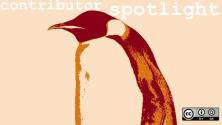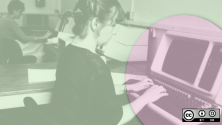Around 1994, I was a database and security consultant in London. Working in the financial sector around Threadneedle Street. In those days, the only choices for home operating systems were Windows 3.1 or, if you had enough memory, the new offering from Microsoft: Windows 95. Both required expensive machines to run. (I had to upgrade my desktop to 8MB in order to successfully install Windows 95!)
Microsoft Office was the go-to office suite for every client, and database environments ran on either mainframes or client server farms on very expensive hardware. Having a home computer on which to learn this software was very expensive.
Around that time, I was chatting with friends on Delphi's IRC network, and I decided to visit freinds in Boston. Before I flew across the pond, I started looking at local Boston Internet service providers (ISPs) so I could have a network account in the U.S. (Remember: these were the days of dial-up, and international roaming charges could break the bank). I found a small ISP that offered a shell account for email and web space, so I rang the owner and discovered that he was running the server from his home on an old 486 with a dial-up to his service provider. More accurately put, he was ringing his friend's house, which then connected him to his ISP (it was a less expensive phone call). At the time, he was using an early version of Slackware Linux.
We started talking through email, and he introduced me to SSH and showed me how to use a secure shell to access my account from the UK. From there, I could read the documentation on a CD that he left in the drive for me to browse. We would often use the talk utility to chat about how the system worked, and over time I learned about this new operating system called "Linux."
I have to admit: at this point, I was hooked. I wouldn't have been able to do a fraction of these things with my proprietary tools, and the friendliness of the Linux community was infectious. When I flew to Boston I met with Patrick, the sysadmin who got me started. We shared a few beers on his porch, and we talked about computers and Linux for most of the night.
Within a couple of months of returning to the UK, I spent almost an entire weekend downloading Slackware Linux via a 56k modem onto approximately 80 floppy disks. My son, who's now 20, will never know the panic of someone interrupting a phone line mid-download and having to start all over again.
From Slackware, I moved to SUSE, which was very popular in Europe at the time. It was still an emerging operating system and occasionally you would end up with a manual partially translated in English and the rest in German (or my personal favourite: half the manual printed upside down!). Occasionally applications would default to the wrong language, but all of this made the experience more fun. The operating system even supported Klingon.
During my day job, I was fighting with Winsock to get a Windows computer to use TCP/IP, but at home, where I was now using Linux, everything was relatively straightforward and worked out of the box. (Be thankful you don't know what Winsock is.) I felt as though using Linux taught me more about the internals of both a personal computer and how the Internet worked. It was like playing an adventure game, learning puzzles, and making my PC do what I wanted it to do. I wasn't alone in this, either. The community was as equally passionate and willing to spend its time answering my questions.
By the time I met my wife and eventually moved to the US, I had been an ardent Linux user for nearly 10 years. I finally made the switch away from proprietary software, and now I only use Linux as my operating system of choice. Over the course of 21 years, I have gone from an old 486 running Slackware to Fedora on my laptop and Debian on my desktops at home. I am very fortunate that I now make a living writing software on an operating system with which I have so much fun. And, that I work with great people who are equally passionate about open source.
I wish I could have bumped into the sysadmin who first got me hooked. He passed away a few years ago. I would have liked to buy him a few beers and thank him for this amazing journey.
This article is part of a series called My Linux Story. To participate and share your Linux story, contact us at: open@opensource.com.







6 Comments